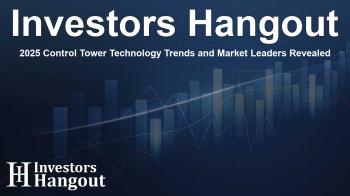2025 Control Tower Technology Trends and Market Leaders Revealed

Understanding the Future of Control Tower Technology in 2025
The Control Tower Technology sector is undergoing transformative changes, driven by advancements in artificial intelligence, automation, and interconnected data platforms. Organizations are beginning to leverage these technologies in smarter ways to enhance the management of global supply chains. This evolution reshapes conventional roles that control tower systems have played in the past. Instead of merely serving as visibility tools, they are becoming proactive orchestration systems that facilitate better decision-making across networks.
Leading Vendors Stepping Up Their Game
As we delve into 2025, it is clear that industry leaders like Blue Yonder, E2open, Infor, Kinaxis, and o9 Solutions are pushing the envelope further than before. These companies are not just highlighting issues; they are actively providing intelligent solutions to help users resolve challenges in real-time. By embedding AI capabilities more intricately into everyday processes, these vendors are enhancing functionality, thus improving overall usability.
AI Agents and Enhanced Decision-Making
Recent trends showcase the amplified use of AI agents that can monitor supply chain flows, simulate various scenarios, and offer actionable recommendations such as rerouting shipments or reprioritizing orders. The implementation of natural language interfaces now allows planners to interact with systems directly. These features enable organizations to model various scenarios, thus preparing for shifts in tariffs or regulatory policies. Consequently, the reduction in manual labor and the provision of timely insights into potential disruptions are key highlights of the current advancements.
Sector-Specific Functionalities
Another noteworthy trend is the growing emphasis on industry-specific functionalities. Vendors are providing pre-configured workflows and data models tailored for different sectors including manufacturing, retail, and healthcare. This vertical integration not only accelerates the time to value for businesses but also minimizes the costs associated with customization, making widespread adoption more feasible and efficient.
Anticipating Future Trends in Decision Support
Looking toward the future, there is a strong expectation that autonomous decision support systems will further extend as AI agents assume greater responsibilities in planning and executing strategies. Companies that invest early in these emerging platforms are strategically positioning themselves to better navigate market volatility, comply with regulatory demands, and uphold resilient supply chain operations.
Evaluating Vendors in the Value Matrix
This year’s Value Matrix highlights leaders who excel not only in function but also in usability, ensuring that their solutions deliver considerable return on investment. In the current landscape, the primary leaders include Blue Yonder, E2open, Infor, Kinaxis, and o9 Solutions. Each of these firms is recognized for offering comprehensive solutions that are adaptable to large-scale needs.
Specialized Vendors Catering to Unique Needs
Furthermore, several specialized vendors stand out for their deep functionality that caters to complex requirements. Companies such as Coupa, Elemica, and SAP excel in providing solutions that are beneficial for niche markets. These expert vendors are equipped to meet specific challenges with tailored offerings.
User-Friendly Accelerators
The market also features a category of Accelerators that focus primarily on simplicity and ease of deployment. This year’s Accelerators include Aioneers, Alloy, FourKites, and Pelico, which offer swift adoption methods with less operational complexity, making them ideal for organizations looking to implement efficient solutions rapidly.
Core Providers for Basic Needs
Additionally, Core Providers deliver reliable functionalities tailored for organizations with fundamental needs. This year's Core Providers consist of Elementum, PearlChain, and ShipitSmarter, ensuring essential capabilities are available for businesses aiming to streamline their processes without demanding specifications.
Frequently Asked Questions
1. What is Control Tower Technology?
Control Tower Technology refers to systems that provide comprehensive visibility and orchestration of supply chain operations, enhancing decision-making capabilities.
2. Who are the leading vendors in this sector?
Top vendors include Blue Yonder, E2open, Infor, Kinaxis, and o9 Solutions, recognized for their innovative approaches in Control Tower Technology.
3. How is AI impacting the Control Tower Technology market?
AI is facilitating smarter decision-making through automation and intelligent data analytics, allowing organizations to respond proactively to disruptions.
4. What are the benefits of industry-specific functionalities?
These functionalities accelerate time to value, reduce customization costs, and make adoption easier for organizations in specific sectors.
5. How can companies prepare for future trends in supply chain management?
Investing in autonomous decision support and AI-driven platforms early will position companies to adapt quickly to market changes and improve resilience.
About The Author
Contact Caleb Price privately here. Or send an email with ATTN: Caleb Price as the subject to contact@investorshangout.com.
About Investors Hangout
Investors Hangout is a leading online stock forum for financial discussion and learning, offering a wide range of free tools and resources. It draws in traders of all levels, who exchange market knowledge, investigate trading tactics, and keep an eye on industry developments in real time. Featuring financial articles, stock message boards, quotes, charts, company profiles, and live news updates. Through cooperative learning and a wealth of informational resources, it helps users from novices creating their first portfolios to experts honing their techniques. Join Investors Hangout today: https://investorshangout.com/
The content of this article is based on factual, publicly available information and does not represent legal, financial, or investment advice. Investors Hangout does not offer financial advice, and the author is not a licensed financial advisor. Consult a qualified advisor before making any financial or investment decisions based on this article. This article should not be considered advice to purchase, sell, or hold any securities or other investments. If any of the material provided here is inaccurate, please contact us for corrections.

